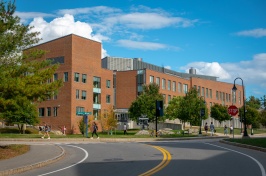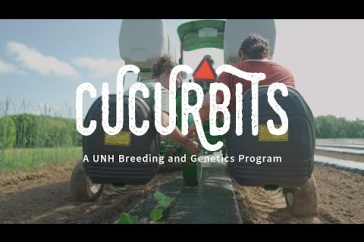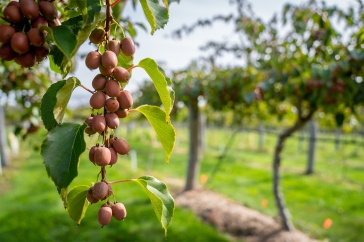
Haley Nolen, who will graduate this summer with a master’s in genetics, conducted research with New Hampshire Agricultural Experiment Station scientists Dr. Tom Davis and Dr. Anissa Poleatewich in the UNH College of Life Sciences and Agriculture. Learn about why this Lake Wales, Florida, native chose UNH for her graduate studies, what she researched, and what she's gained from her research experience.

Why did you decide to pursue your degree at UNH?
I had applied to multiple schools for graduate school and eventually decided on UNH because of the amazing faculty. I was in contact with both Tom and Anissa before applying and deciding on a lab, and they were both so helpful and friendly throughout the application process that it definitely swayed my decision to come to UNH. I also was looking forward to moving to an environment where I could enjoy both the beach and mountains, and Durham was a perfect location.
What is the focus of your research interests and why?
I am interested in disease resistance in plants and the genetic basis behind resistance to develop more tolerant crops to be incorporated in agriculture. I was inspired to pursue an education and career in this field after a visit to Guatemalan coffee farms and seeing first-hand how plant pathogens can devastate communities and livelihoods of indigenous farmers. I am working to identify sources of disease resistance in New England native quinoa relatives to be incorporated into a breeding program so that we are able to develop a New England variety of quinoa that can be grown efficiently here by local farmers.
What do you wish your colleagues, friends, and family knew about your work?
Sometimes I feel like when I tell people I work on quinoa my research comes off as this niche thing that they can’t really relate to unless they eat quinoa. But in reality, quinoa is a crop with so many beneficial qualities and has been in indigenous cultures for thousands of years, is considered a candidate crop for space agriculture, and is a good source of nutrition for those living in developing nations. The uses for quinoa go so far beyond a new diet trend.
What is it like having NH Agricultural Experiment Station researchers Dr. Anissa Poleatewich and Dr. Tom Davis as your mentors?
I love them both as my advisors! They both help me so much in different ways and it’s awesome to have two advisors that are such experts in their respective fields.
What would you tell prospective graduate students about your research experience? What do you feel you gained most from it?
I would tell prospective students that graduate school is definitely a series of highs and lows, and to always be proud of yourself and celebrate even the smallest accomplishments! I have definitely learned a lot about myself thus far in grad school and am especially grateful for grad school basically forcing me out of my comfort zone to do things I would typically never do.
Have you learned or discovered anything during your research that has surprised you? If so, what?
In my undergrad education I never really payed attention to microbial genetics, but throughout my master’s research I have learned so much about fungal genetics and evolution. It is really mind-blowing how complicated it is!

What do you consider your biggest challenge?
Being in grad school has caused me to realize that impostor syndrome is a very real thing and affects so many people. I am still learning how to not be too hard on myself and establish a clear work-life balance, without feeling guilty for taking time off. Grad school/research takes a lot of work and can take a toll on students’ mental health, and I think that is a universal challenge among all grad students.
What drives you?
I would say my experiences in Guatemala and genuine curiosity for what I study drives me to further my education. While I am studying life sciences and the biological aspect of disease resistance in agriculture, I am definitely passionate about the social and economic aspects of agriculture and ensuring indigenous and local farmers are fairly treated in the industry.
What are you most proud of?
I am honestly proud of making it this far in my education! I am a first-generation college student and the first person in my immediate family to get a bachelor’s degree, let alone a master’s degree.
What are your plans after graduation? What do you plan to do with your degree?
I actually like UNH and my project so much that once I finish my MS I will be continuing here in Fall 2019 for my PhD. After completing my PhD my hopes are to start a career in industry working for a company that aims to develop crops to improve grower profitability and livelihood, and environmental sustainability.
Tell us a fun or interesting fact about yourself.
I used to live in Florida and worked at Legoland. I worked in the waterpark and got to meet people like T-Pain, Jennifer Hudson, Mariah Carey, and Nick Cannon!
-
Written By:
Lori Tyler Gula, PhD | NH Agricultural Experiment Station | lori.gula@unh.edu | 603-862-1452


















































